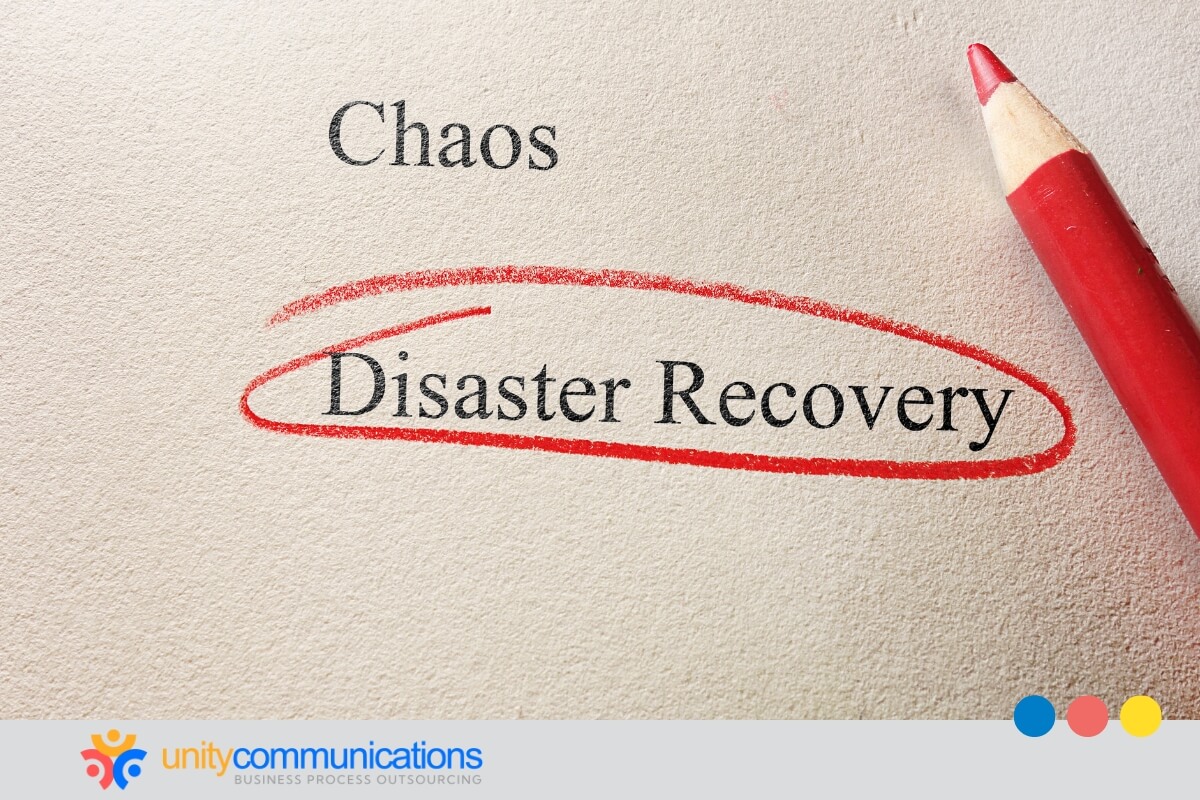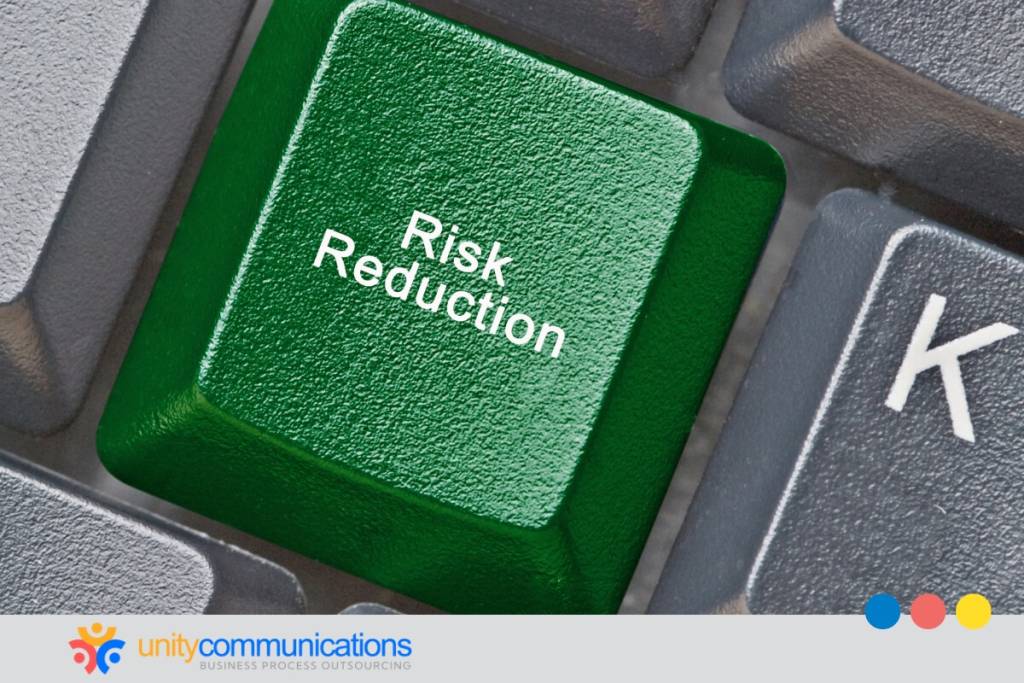IN THIS ARTICLE
Table of Contents
In recent years, the frequency and intensity of natural disasters have surged. Floods, hurricanes, wildfires, and earthquakes continue to grow in severity due to climate change, urbanization, and population boom. Hence, disaster risk reduction (DRR) is more crucial than ever.
Despite the pressing need for robust DRR strategies, disaster risk management agencies, non-governmental organizations (NGOs), and government offices face significant obstacles. Limited resources and the complexity of coordinating disaster preparedness, response, and recovery efforts often leave them stretched thin and struggling to keep pace with the rising risks.
Business process outsourcing (BPO) emerges as a viable solution, providing innovative ways for organizations to streamline processes, boost efficiency, and manage disaster risks more effectively.
Keep reading to learn how BPO providers and disaster risk reduction organizations can collaborate to better protect communities.
Importance of BPO in disaster risk reduction
 Disasters have become more frequent and severe, demanding immediate attention. In 2021 alone, 432 major events were recorded and 101.8 million people were affected globally, with economic losses reaching $252.1 billion. These numbers highlight the growing urgency for effective disaster management strategies.
Disasters have become more frequent and severe, demanding immediate attention. In 2021 alone, 432 major events were recorded and 101.8 million people were affected globally, with economic losses reaching $252.1 billion. These numbers highlight the growing urgency for effective disaster management strategies.
Organizations increasingly leverage BPO to improve their DRR efforts. BPO providers offer specialized services such as real-time monitoring, data management, and emergency response coordination. By outsourcing these tasks, companies gain access to advanced technology and expert teams that allow them to stay agile during disasters and maintain continuity.
What is BPO’s role in disaster risk reduction? Here’s a detailed overview:
Preparing for disasters
Disaster preparedness is the foundation of effective DRR. BPO providers help organizations develop comprehensive disaster preparedness plans by offering specialized services such as risk analysis, resource mapping, and process optimization.
Another critical aspect of DRR is workforce planning. BPO companies can assist in maintaining a flexible workforce by managing recruitment, training, and scaling emergency personnel. They can assign enough people to the disaster management team to prepare for various scenarios.
Moreover, outsourcing partners provide organizations with real-time monitoring and early warning systems, leveraging technologies such as artificial intelligence (AI) and predictive analytics to improve disaster forecasting.
Lastly, BPO services offer continuity in the face of disruptions. They ensure essential business processes, such as support services, remain operational even during a disaster.
By outsourcing non-core functions, disaster risk management teams can focus on critical tasks without worrying about business continuity issues, leading to a more efficient response during crises.
Enhancing disaster response efficiency
Responding quickly and effectively during disasters can make all the difference in minimizing damage and saving lives. BPO providers enhance response efforts by offering scalable resources and technologies that allow organizations to react swiftly.
BPO firms provide additional staffing and logistical support, particularly when internal resources are overwhelmed. They also provide access to call centers, emergency hotlines, and other vital communication tools so governments and NGOs can disseminate critical public information and coordinate with first responders.
Outsourcing teams also handle back-end operations, allowing on-ground teams to focus on immediate relief and rescue efforts.
Moreover, BPO companies facilitate access to advanced technologies such as cloud computing, real-time data analytics, and geographic information systems (GIS) to help disaster management professionals track developments, assess needs, and deploy resources more efficiently.
Focusing on disaster recovery and continuity
Disaster recovery is a long and complex process requiring expertise, coordination, and careful planning. Outsourcing partners play a significant role in managing recovery efforts by offering services such as claims processing.
BPO services enable organizations to quickly restore essential operations following a disaster. For example, outsourcing claims processing during natural disasters ensures that affected communities receive financial support faster. By streamlining these processes, BPO providers allow NGOs and government agencies to focus their efforts on rebuilding communities.
Business continuity management is another area in which BPO contributes to disaster recovery. BPO providers ensure mission-critical systems, such as information technology (IT) infrastructure, continue functioning during recovery. By managing these systems off-site or through the cloud, BPO firms protect sensitive data and help organizations recover quickly.
Optimizing communication during disasters
Effective communication is a cornerstone of disaster management. Over one-third of people need help getting disaster information. BPO providers create robust communication frameworks for seamless information flow between stakeholders, including government agencies, first responders, and affected communities.
BPO companies offer dedicated communication channels, such as call centers and emergency hotlines, to handle a surge in inquiries during disasters. These outsourcing services relieve the pressure on internal teams while ensuring vital information reaches those in need.
Moreover, BPO providers manage digital platforms and social media channels, critical for disseminating real-time information during disasters. They also implement crisis management strategies to correct misinformation and coordinate efforts across different organizations.
Analyzing risks
BPO providers are experts in risk assessment, a critical component of disaster risk reduction. Through outsourcing, organizations can use tools and services to gain a more detailed understanding of potential hazards.
BPO firms perform advanced data analytics and simulations to assess risks and inform organizational decisions about resource allocation and response strategies. They also conduct vulnerability assessments to identify weaknesses in infrastructure, supply chains, and communication systems.
A valuable aspect of BPO risk analysis is collaborating with experts from diverse fields, such as environmental science, urban planning, public health, and engineering. An interdisciplinary approach ensures that risk assessments are thorough and actionable. They can cover immediate threats and long-term vulnerabilities related to climate change.
By outsourcing risk analysis to BPO providers, organizations gain access to specialized expertise and free up internal resources to focus on core business activities. BPO firms’ continuous monitoring and evaluation also allow businesses to stay ahead of threats, adapt to changing risk environments, and refine their disaster response strategies.
Managing resources and logistics
Managing resources effectively during a disaster minimizes loss and ensures timely responses. BPO providers excel in logistics management. They offer solutions that optimize resource allocation so aid reaches the correct locations promptly.
BPO services include supply chain management, inventory tracking, and transportation coordination. Organizations can immediately determine and allocate the available resources based on real-time needs. Optimizing these processes reduces waste, prevents bottlenecks, and speeds up supply deliveries to affected areas.
Moreover, outsourcing logistics provides flexibility. BPO providers can rapidly scale operations during times of crisis, deploying additional resources or re-routing supplies to meet changing demands. This adaptability ensures organizations can respond to unforeseen challenges with minimal disruption to their relief efforts.
Managing resources and logistics efficiently through BPO solutions speeds up disaster response and helps organizations build long-term resilience. With the right logistical strategies, firms can better prepare for crises and allocate resources efficiently.
Assessing and handling of data
Data management and analysis are the backbone of effective disaster risk reduction (DRR) strategies, but many organizations struggle with this aspect. About 46% of organizations don’t use data to gain insights or make decisions, creating a significant gap in initiatives.
BPO companies provide the infrastructure and expertise to manage vast data, from early warning systems to post-disaster damage assessments. Their services include data collection, storage, and real-time analytics.
By outsourcing these tasks, organizations can focus on applying insights rather than managing data logistics. BPO providers also secure data, particularly in sensitive environments where breaches could compromise disaster response efforts.
Furthermore, BPO companies use artificial intelligence (AI) and machine learning to analyze patterns and trends, obtain valuable insights that help organizations anticipate disasters, and plan accordingly. This proactive approach leads to more resilient disaster management frameworks and reduces the impact of future hazards.
Providing specialized expertise and training
Specialized expertise is essential in DRR, and BPO providers offer tailored training and development programs to prepare disaster management teams. BPO firms provide targeted training in crisis management, emergency response coordination, risk mitigation, and other relevant areas.
BPO-led training helps teams stay updated with the latest disaster risk reduction techniques and technologies. They can customize these programs based on each organization’s unique risks and requirements for a more flexible and scalable solution.
Moreover, BPO vendors offer ongoing support to better prepare disaster management teams to face new and evolving challenges. This support can include regular updates, refresher courses, and access to new resources that keep the teams informed about the latest developments in disaster preparedness.
The bottom line

With natural disasters on the rise, solid DRR strategies are crucial. BPO offers a practical and efficient way for organizations to enhance their disaster risk reduction efforts. It can streamline data management, communication, logistics, and risk assessment.
With outsourcing, teams can focus on what matters most: protecting communities and responding effectively when disasters strike.
For any organization looking to stay resilient in the face of growing disaster risks, BPO is a smart and strategic choice. Ready to see how BPO can support your disaster management goals? Let’s connect.





